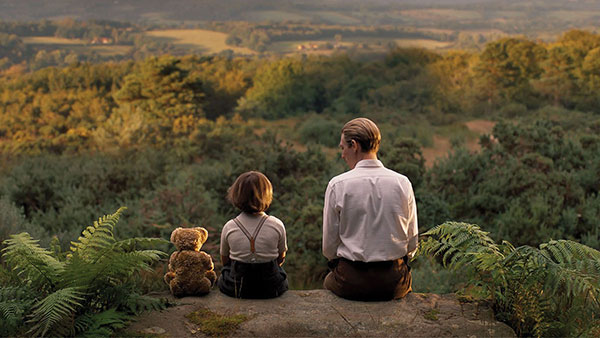This summer we are re-running my most-read blogs from the past year, in case you didn’t have an opportunity to read them the first time around. I’ve rewritten each one of these, so even if you’ve read them before, you may wish to read them again! Here is the seventh of those articles:
I recently watched (on TV) Goodbye Christopher Robin, which tells the life story of the boy so key to Winnie-the-Pooh, by A.A. Milne. According to the movie, Pooh is the “most loved children’s book of all time.”
The depicted story of the Christopher Robin’s life is a painful one. A.A. Milne, (Christopher’s father) played by Domhnall Gleeso, was a veteran of World War One, and suffered from PTSD syndrome, which caused him—a very successful West End playwright—to suffer debilitating war-induced flashbacks—to have a repressed emotional life—and a hard time being an engaged father.
Christopher’s mother (played by Margot Robbie) is depicted as selfish, exploitative of her son’s fame, and a snobbish upper-class lady.
The most consistent love in Christopher’s life comes from his Irish nanny (played by Kelly Macdonald)—who is dismissed when she objects to the way Christopher is mistreated.
The very young Christopher Robin is played, charmingly, by Will Tilston.
The movie suggests that the Pooh stories came to life when Christopher and his father enjoy a rare time alone together in rural England. Mother has left for London to enjoy the high life, while the nanny has gone away to take care of her dying mother. In other words, get rid of the women, and creativity happens.
But the essential story revealed here is the deep resentment Christopher felt as to how he was exploited, and cheated of parental love, so as to promote the Pooh books. As depicted, he spent much of his young adult life trying to get away from his literary persona.
What does the film tell us about Winnie-the-Pooh? Very little except to suggest how some of the book’s charming points came from some of the rare moments when father and son enjoyed time together,

What does the film tell us about children’s literature, or the writing life? Nothing.
What does the film tell us about early 20th Century British parenting? That it was pretty pathetic.
At the end of the movie we are told (via subtitles) that Christopher refused to take a penny of the massive money engendered by Pooh, that he always remained in contact with his former nanny, and that he created and ran a bookstore.
I liked that part.
But it also suggests that a book—however dependent on the realities of an author’s life—that life has little to do with how readers receive it. When it comes to books, it’s not authors, but readers, who determine what the book will be.
3 thoughts on “<em>Goodbye, Christopher Robin</em> Redux”
I love the last sentence in your post. Your books were very special in my classroom and when I became a librarian. I chose to read The True Confessions of Charlotte Doyle aloud to a my first 4th grade class. My class were all challenged readers. It took a couple chapters to capture their attention but soon we were reading for one hour at a time. They loved the book. That was in the fall of 1993 in Austin Texas and I have enjoyed reading many more of your books.
I have been teaching for 25 years, mostly 4th and 5th graders. I read The True Confessions of Charlotte Doyle every year to my class and the reaction from my students is always so positive. We were excited the year we heard it was going to be made into a movie, but it fell through. I still think it would make a fabulous film, but it would be tough to meet the standards and vision set by Avi’s writing. I’m so glad to continue to share your stories with my students.
I’m touched by your words. Just this morning I was going through very- old letters and papers which chronicled years of writing effort. What’s missing of course are the readers, like your students who listened to the words, which you brought to life. Thank you.